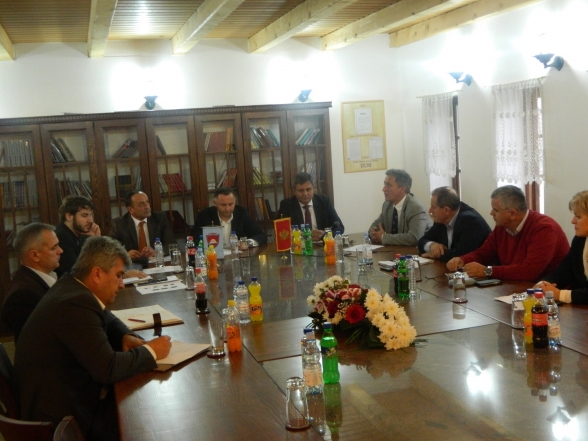At the public debate held today, students were addressed by the Chairman and members of the Committee on European Integration, Mr Slaven Radunovic, Mr Šefkija Murić and Mr Koča Pavlović, focusing on the measure of importance of the role of young people in the European integration process and the dynamics of reforms in the society. Organizing public debates with high school students is one of the way the Committee on European Integration is using in order to bring the negotiation process closer to citizens, especially taking into consideration that most of the meetings dealing with negotiation process are closed to the public. Presenting the benefits that young people have at this stage of integration, MPs paid particular attention to Erasmus +, the new program for education, training, youth and sport, for which EUR 14.7 billion has been allocated for the period 2014-2020. The program is about the promotion of learning opportunities for citizens of the European Union and beyond, cooperation between educational institutions, youth local and regional authority’s organizations, as well as support in the process of policy reform in Member States and cooperation with countries that are not part of the EU.
Making public debates constructive and extremely inspiring, students showed interest in issues related to education reform and its reflection in society, what were positive aspects of negotiations, and what were the values that Montenegro should preserve and inherit from the European Union. However, there were some specific comments, related to the exploitation of oil and gas on the territory of Prevlaka and its influence on the relations between the two countries, then the advantages and disadvantages of using euro in Montenegro, and whether there was a possibility for the polarization of society to those aspiring to the European Union and those turning to Russia.
Meetings with management of municipalities of Berane and Bijelo Polje was marked by the exchange of views on the possibilities of deepening cooperation at the state and local level, as well as implemented projects, with emphasis on the IPA support program. In that respect, representatives of these local governments readily share their experiences with other municipalities, and via the Committee of the Regions they provide contacts at the European level. At the meeting it was pointed out that in Montenegro, within the Financial IPA II program there has been offered a total of EUR 270 million, and that it was essential to provide creative ideas and the administrative and technical staff, able to write and implement the project, in order to take advantage of the given resources.
Representatives of the local government in Berane positively assessed the implemented project of the Fire Station, and pointed out the two that were announced – the Collector, with a total value of EUR 10 million and the House for Refugees, for which the funds were expected to be provided from the Regional Housing Fund. As far as the municipality of Bijelo Polje is concerned, previous projects financed by IPA have been done in the areas of culture, education, social protection, and infrastructure, such as the Wastewater treatment collector and City parking garage.
The next public debate of the Committee on European Integration will be organized in the central part of Montenegro until the end of the year.









